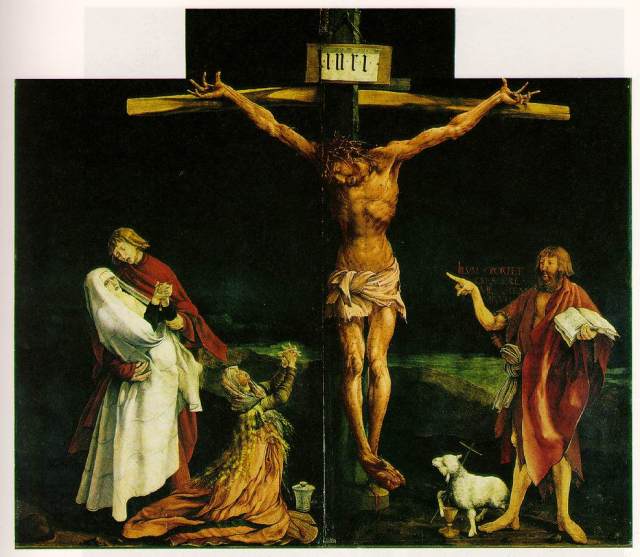Preparing a speech is something I have done in the past and is an activity I have relished. While there is certainly a great deal of anxiety that comes with performing before an audience, the thought process that goes into presenting a message to others is unlike anything else. When I have written essays, the intended audience is almost always the grade. I see that the only people who will generally read these assignments are myself and the professor. In writing a journal, I know the primary audience is myself. Even this blog, something that other will read, is written as a means of communicating my personal beliefs to a larger whole. It is a means of pointing my audience to myself and to whatever I have thought is relevant and meaningful enough to share.

There is a painting done by Matthias Grunewald called the Isenheim Altar piece. In it, John the Baptist stands to the right of the crucified Jesus and points to him. This painting was most recently brought up in a class by a visiting
The role of the preacher is to facilitate the spirit. Prior to this year, I had never realized the reality of this statement. I have written two sermons at this point, a smaller one for my multi-faith worshiping community and a full length one for my preaching class. In both, my creativity in putting words to the page was inspired by my faith and I felt as though I truly was working with the spirit. Being a somewhat of a liberal intellectual, I feel very odd acknowledging a reality of God in my life. I often think of His esoteric presence, something that is influential but not powerfully moving. However, by beginning to point to the cross, there is a power the raises my eyes to that reality. In writing a sermon, I feel as though I look upon that Cross, the holy to which I am trying to understand, and am captivated by its complexity and depth. Only after taking time and internalizing the sermon do I pull myself away enough that I can look to my audience, reach out my hand, and invite them to look on with me at what I am trying to understand. A preacher’s objective in speaking is not to confine the Cross in his or her words but to use his or her words as a key to a latched door. The objective is to open the audience to the presence and power of the Spirit in the many forms it takes so that their lives might be changed. professor, but it is one I have seen a few times since high school. It has been explained to me that John represents the modern preacher and indicates his/her role in that vocation. To preach the word of God, to lead a religious community, is to point to the cross. I would take this meaning a bit further and say that the preacher’s role is to point to the Cross and God’s truth with one hand and stretch out his or her other in a gesture that would say, “Come with me and let us see”.
When I write a sermon, because I am trying to point to the cross, a sense of responsibility grips me. It is a responsibility to the Spirit, to the text, to those that have written it, and to myself and my audience. It is a space in which I must interweave the issues that face us today with the Presence which brings people to church. But more than anything, I have seen the opportunities as a gift in which I am able to share my experience in a way which connects myself and others to God. I hope that in my future endeavors at sermon writing I can honor the opportunity that is given to me with humility and wisdom.

